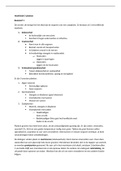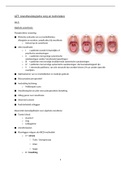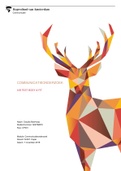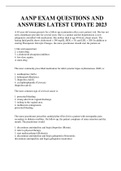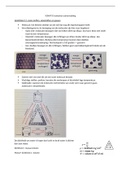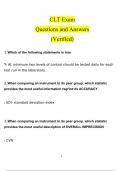Nineteenth century literature in English I
LES 28/09: intro romanticism
1. Paintings
o Romantic painting Joseph Turner: The Fighting
Temeraire (1834)
o Relate to romanticism
o Sky, colour, nature, playing with light,
Vague, dreaming
o Painter is involved in painting (point of
view)
o Temeraire = ship (refers to event war against Napoleon) last ship that
fought in the battle
o Turner gave it the word fighting, ship not in foreground (reflection on
time: moon and sun fighting same as ships)
o This kind of ships are over, they now have steamboats (steamboat in
dark so Turner wasn’t a big fan of revolution)
o Romanticism is not new (already with German going back into nature)
o Mind something different from soul also new for Romantics (Decartes)
o Mind= the way that our brain makes ourselves known to us
o If mind dies souls die to (so souls come form nature)
o Everything is connected
o Divine nature approach trough art
o Romantic painting: john Constable Dedham Vale, 1802
1. The ‘long nineteenth century’
o 1781 start of century with French revolution
o End 1914 WO I
o Age of revolution – age of capital – age of empire (first half 19 th century is age of
revolution)
o French revolution (1789), American revolution (1776), Belgian revolution
(1830), IR, Germany unified 1870, unification of Italy, idea of nation state
is new to 19Th century
o All EU went to war so whole world is at war (all revolutions snowball effect to
1914)
o Age of empire (British empire under Queen Victoria)
o Romanticism: make it new, time of experimentation
o BIG 6 poets
o Poem William Blake ‘London’ (p60) SEE BOOK
1. Romanticism = aesthetic movement (features document)
o EXAM: NOT QUESTION DIRECTLY FROM DOCUMENT
o Literary history vs. chronology
o The canon
o British revolution vs. American revolution
o Attitudes toward revolution (all break poetry as it was back then in their own
way)
o Painting Friedrich (see pwp features)
,LES 5/10: The big 6 (1)
1. Painting: Tintern Abbey
Abandoned abbey
Still highly stylised so not typical painting could be photo
Romantic feature
o few people
o return to nature because abbey is ruined
many poems about the abbey because of the inspiring nature, of Wordsworth’s poem
Painting 2: Turner
o Also Tintern abbey 1794
1. the ‘mind-forg’d manacles’
Poem London Blake word pops up (60)
Minds are constrained by world around us
Rousseau (1712-1778)
o Social contract (how people should behave in society)
Idea of limited freedom
Not listen to laws (looks normal now)
Society organised by will of people (before democracy)
We are born as free people, but being civilised made us mind forg’d
manacles
o Émile, ou de l’éducation: Noble savage
People uncivilised, no strains (no mind forg’d manacles)
So child is noble (closer to natural state)
o Responsible for the ideas of French revolution
Edmund Burke (1729-1797)
o Father of conservative movement (before 2016)
o Stood for rightful treatment
o Not a fan of French revolution because it overthrew society as it was back then
o Reflections on the revolution in France
o A philosophical enquiry into the Origins of our ideas of the sublime and beautiful
Neoclassicism is an art of the beautiful and romanticism is an art of the
sublime
Beautiful can be attained, sublime can we strive to but never attain
o Painting Turner snowstorm (SUBLIME)
Overwhelming, terrifying (sort of beauty)
Definition sublime (see quote) effort to capture something beyond
reason
Thomas Paine (1737-1809)
o Book common sense
For break with English monarchy
Decide our own destiny and fate
o Rights of men (1791)
French monarchy abolished
o Wollstonecraft: vindication of the rights of men (women) (1790, 1792)
Agree with Thomas Paine
What about women ? (ironic excuses to own sex)
William Godwin (1756-1836)
o An anarchist = radical self-rule, argued for complete abolition of monarchy
o Thins as they are, The adventures of Caleb Williams (1794)
, o An Enquiry concerning political justice (1790)
Response to Edmund Burke
o W. and G. are the parents of Mary Shelly
o Hero for many poets
1. Anna Laetitia Barbauld (1743-1825)
Oldest to be called romantic (she is getting there)
Very progressive woman (in favour of French revolution)
Fell quickly out of favour for being too progressive
Poem: Rights of women (p36) SEE BOOK
o Unromantic: ?????
1. The Lake poets: Wordsworth and Coleridge
Called this way because they moved to lake district (more and more did this)
Walk and think about the environment
Wordsworth (1770-1850)
o Definition of poetry: “Spontaneous overflow of powerful feelings: it takes its
origin from emotion recollected in tranquillity”
o 1795: moved to lake district
o Lines written in early spring (129) SEE BOOK
o The world is too much with us (189) SEE BOOK
o Lines composed a few miles above Tintern Abbey (131-135) SEE BOOK
o Ode: Intimations of Immortality from recollections of early childhood
LES 12/10: the big six (2nd generation) NOTHING ABOUT BYRON
Painting intro
o Lord Byron
o Ironic hero/ tormented hero (border between good and evil)
o Presented as romantic but is not
o Emphasis on imagination, nature
o Death is shown (died all very young: Shelley, Keats, Byron)
Second painting
o Poet who dies young and was a hero to the romantic writers
EXAM
o Never give a name of author, know yourself
o how poems can be asked
Give a famous line and you need to say who wrote it and why
o Give a passage and say why it is typical for the author and the features of
romanticism
o Two passages and compare them
1. The big six part two: Coleridge- Byron, Shelley, Keats
Ode: Intimations of Immortality from recollections of early childhood (181) SEE BOOK
(to Coleridge)
Coleridge (1722-1834)
o Was friend with Wordsworth (wrote together Lyrical Ballads)
o Quote from Biographia Literaria talking about lyrical ballads
For Coleridge poetry depends on willing suspension of disbelief
Believe in science fiction when you have to
o Tell us what literature should be and do
o Was kind of a Saint (visit him for advice)
o Was an opium addict (write about that)
o Was kind of an idealist (started his own utopia in America)
LES 28/09: intro romanticism
1. Paintings
o Romantic painting Joseph Turner: The Fighting
Temeraire (1834)
o Relate to romanticism
o Sky, colour, nature, playing with light,
Vague, dreaming
o Painter is involved in painting (point of
view)
o Temeraire = ship (refers to event war against Napoleon) last ship that
fought in the battle
o Turner gave it the word fighting, ship not in foreground (reflection on
time: moon and sun fighting same as ships)
o This kind of ships are over, they now have steamboats (steamboat in
dark so Turner wasn’t a big fan of revolution)
o Romanticism is not new (already with German going back into nature)
o Mind something different from soul also new for Romantics (Decartes)
o Mind= the way that our brain makes ourselves known to us
o If mind dies souls die to (so souls come form nature)
o Everything is connected
o Divine nature approach trough art
o Romantic painting: john Constable Dedham Vale, 1802
1. The ‘long nineteenth century’
o 1781 start of century with French revolution
o End 1914 WO I
o Age of revolution – age of capital – age of empire (first half 19 th century is age of
revolution)
o French revolution (1789), American revolution (1776), Belgian revolution
(1830), IR, Germany unified 1870, unification of Italy, idea of nation state
is new to 19Th century
o All EU went to war so whole world is at war (all revolutions snowball effect to
1914)
o Age of empire (British empire under Queen Victoria)
o Romanticism: make it new, time of experimentation
o BIG 6 poets
o Poem William Blake ‘London’ (p60) SEE BOOK
1. Romanticism = aesthetic movement (features document)
o EXAM: NOT QUESTION DIRECTLY FROM DOCUMENT
o Literary history vs. chronology
o The canon
o British revolution vs. American revolution
o Attitudes toward revolution (all break poetry as it was back then in their own
way)
o Painting Friedrich (see pwp features)
,LES 5/10: The big 6 (1)
1. Painting: Tintern Abbey
Abandoned abbey
Still highly stylised so not typical painting could be photo
Romantic feature
o few people
o return to nature because abbey is ruined
many poems about the abbey because of the inspiring nature, of Wordsworth’s poem
Painting 2: Turner
o Also Tintern abbey 1794
1. the ‘mind-forg’d manacles’
Poem London Blake word pops up (60)
Minds are constrained by world around us
Rousseau (1712-1778)
o Social contract (how people should behave in society)
Idea of limited freedom
Not listen to laws (looks normal now)
Society organised by will of people (before democracy)
We are born as free people, but being civilised made us mind forg’d
manacles
o Émile, ou de l’éducation: Noble savage
People uncivilised, no strains (no mind forg’d manacles)
So child is noble (closer to natural state)
o Responsible for the ideas of French revolution
Edmund Burke (1729-1797)
o Father of conservative movement (before 2016)
o Stood for rightful treatment
o Not a fan of French revolution because it overthrew society as it was back then
o Reflections on the revolution in France
o A philosophical enquiry into the Origins of our ideas of the sublime and beautiful
Neoclassicism is an art of the beautiful and romanticism is an art of the
sublime
Beautiful can be attained, sublime can we strive to but never attain
o Painting Turner snowstorm (SUBLIME)
Overwhelming, terrifying (sort of beauty)
Definition sublime (see quote) effort to capture something beyond
reason
Thomas Paine (1737-1809)
o Book common sense
For break with English monarchy
Decide our own destiny and fate
o Rights of men (1791)
French monarchy abolished
o Wollstonecraft: vindication of the rights of men (women) (1790, 1792)
Agree with Thomas Paine
What about women ? (ironic excuses to own sex)
William Godwin (1756-1836)
o An anarchist = radical self-rule, argued for complete abolition of monarchy
o Thins as they are, The adventures of Caleb Williams (1794)
, o An Enquiry concerning political justice (1790)
Response to Edmund Burke
o W. and G. are the parents of Mary Shelly
o Hero for many poets
1. Anna Laetitia Barbauld (1743-1825)
Oldest to be called romantic (she is getting there)
Very progressive woman (in favour of French revolution)
Fell quickly out of favour for being too progressive
Poem: Rights of women (p36) SEE BOOK
o Unromantic: ?????
1. The Lake poets: Wordsworth and Coleridge
Called this way because they moved to lake district (more and more did this)
Walk and think about the environment
Wordsworth (1770-1850)
o Definition of poetry: “Spontaneous overflow of powerful feelings: it takes its
origin from emotion recollected in tranquillity”
o 1795: moved to lake district
o Lines written in early spring (129) SEE BOOK
o The world is too much with us (189) SEE BOOK
o Lines composed a few miles above Tintern Abbey (131-135) SEE BOOK
o Ode: Intimations of Immortality from recollections of early childhood
LES 12/10: the big six (2nd generation) NOTHING ABOUT BYRON
Painting intro
o Lord Byron
o Ironic hero/ tormented hero (border between good and evil)
o Presented as romantic but is not
o Emphasis on imagination, nature
o Death is shown (died all very young: Shelley, Keats, Byron)
Second painting
o Poet who dies young and was a hero to the romantic writers
EXAM
o Never give a name of author, know yourself
o how poems can be asked
Give a famous line and you need to say who wrote it and why
o Give a passage and say why it is typical for the author and the features of
romanticism
o Two passages and compare them
1. The big six part two: Coleridge- Byron, Shelley, Keats
Ode: Intimations of Immortality from recollections of early childhood (181) SEE BOOK
(to Coleridge)
Coleridge (1722-1834)
o Was friend with Wordsworth (wrote together Lyrical Ballads)
o Quote from Biographia Literaria talking about lyrical ballads
For Coleridge poetry depends on willing suspension of disbelief
Believe in science fiction when you have to
o Tell us what literature should be and do
o Was kind of a Saint (visit him for advice)
o Was an opium addict (write about that)
o Was kind of an idealist (started his own utopia in America)

